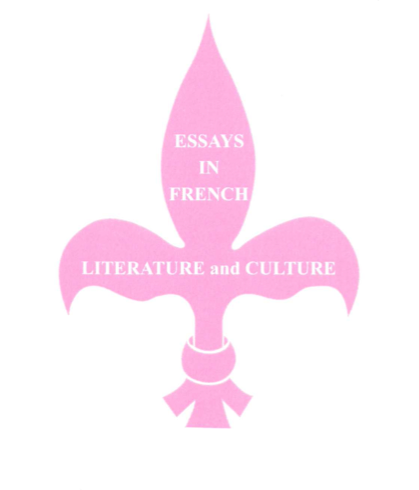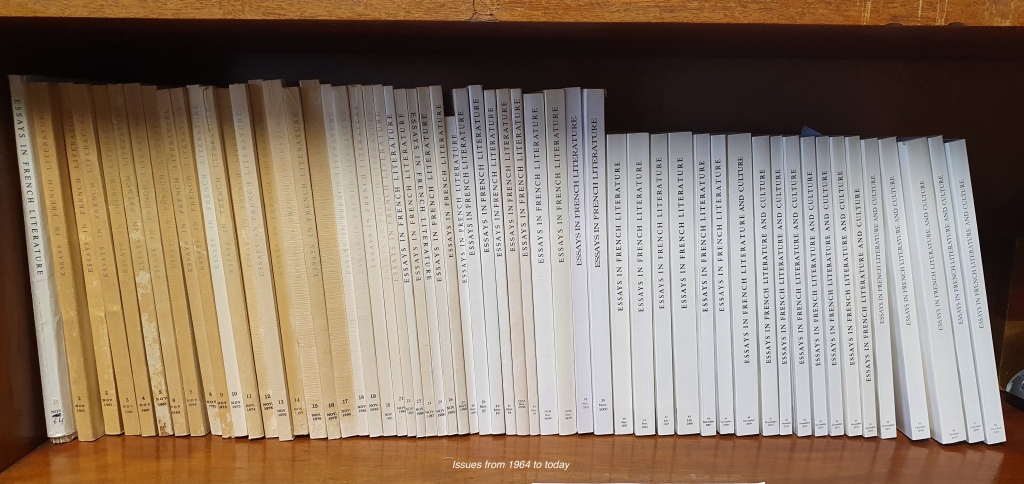The Editorial Board invites Guest editors to propose themes for future issues.
La Retraduction Revisitée/Retranslation revisited, 59, 2022
Dirigé par Hélène Jaccomard
En 1990, sortait un numéro de la revue Palimpsestes entièrement consacré à la retraduction, ouvrant un nouveau champ d’investigation de la traductologie, alors que le phénomène de retraduction était aussi ancien que la traduction, sans avoir fait l’objet d’un intérêt approfondi jusque-là. Dix ans après cet ouvrage central, et en empruntant son titre à Antoine Berman en guise d’hommage, Essays in French Literature and Culture appelle les chercheurs en études françaises à partager leurs conceptions sur la retraduction, soutenues le cas échéant par leurs pratiques retraductives ou leurs analyses de retraductions existantes.
Critical French Medical Humanities, 58, 2021
Guest edited by Enda McCaffrey, Nottingham Trent University, and Dr Aine Larkin, Aberdeen University, guest edited this issue on the emerging theme of the French Critical Medical Humanities.
Interdisciplinary in approach but also a bellwether of changing attitudes to medicine, mental and physical health and healthcare practices in France, the critical French Medical Humanities have emerged with a distinctive/critical pulse on the dynamic interface between the embodied experience of illness and disease, and the republican institutions of health and medicine that shape everyday life in France today.
Identity and Environment, 57, 2020
Landscape and the environment have long been central concerns of writers, artists and filmmakers.
This issue selected papers from the amnual conference of the Australian Society of French Studies in 2018, University of Western Australia, seeking to reflect on the ways in which identity is created in relation to place. How do we make sense of our relationship to environment and place and our interactions with our surroundings? For centuries, changes to urban and rural landscapes along with shifting patterns of migration have caused individuals and peoples to reshape their sense of self and their identities. Creative works dealing with questions of place and environment also commonly raise related social, political and economic issues. And if in recent decades climatic issues have risen to the forefront of debate, how do these issues play out in mainland France and in the wider Francophone sphere?
Dirigé par Kathleen Gyssels et Jacqueline couti
Ce numéro d’Essays in French Literature and Culture vise à (dé)construire l’imaginaire du féminin, la reconstruction, entre mythe et réalité (XIX-XXI siècle), de l’Antillaise et de l’Afro-descendante. Il s’agit de faire la pleine lumière sur les nombreuses subordinations pérennes dans les sociétés antillo- guyanaise et leurs diasporas.
Guest Edited by Hélène Jaccomard, University of Western Australia
Essays in French Literature and Culture publie un numéro par an, généralement consacré à un thème particulier. Au lieu d’un thème unique, le présent numéro est, à l’inverse, le résultat d’un appel à contributions ouvert à tous les domaines de recherche de l’univers culturel d’expression française. La diversité des centres d’intérêt déployés par les chercheurs émerge sans aucun doute, avec des articles venant de tous les horizons et quelques lignes de force communes, ne serait-ce que par le choix délibéré d’étudier des genres paralittéraires ou de ré-examiner certains auteurs consacrés sous des angles originaux et féconds.
Hidden words, Hidden worlds: everyday life and narrative sources (France 1939-1945), 54, 201
Dirigé par Lindsey Dodd, University of Ubbersfield, et Wendy Michallat, University of Sheffield, ce numéro a pour thème la vie quotidienne dans la France des années 1939-1945 faisant ressortir les paroles et les mondes cachés de cette période troublée.
C’est ainsi qu’on apprend l’histoire des droits des sourds-muets et qu’on entend la voix des enfants sous la France de Vichy, celle d’une «Malgré-elle », une de ces Alsaciennes enrôlées de force, des travailleurs indochinois en France, des Résistants ou encore des étudiantes anglaises qui sont parvenues à poursuivre leurs études en France. Le numéro est également un hommage à Robin Adamson, membre du comité éditorial de la revue décédée l’année dernière et qui avait entamé une recherche sur ces étudiantes, dont Christine Morrow au premier chef. L’intérêt de ce numéro est aussi dans la réflexion de Rémy Cazals sur la place des témoignages directs dans l’Histoire, et dans l’analyse d’initiatives pour préserver les sources d’époque comme le site fleeinghitler.org.
Conflict, 53, 2016
Guest edited by Kerry Mullan and Chantal Crozet, RMIT, the issue was the outcome of the Australian Society of French Studies 22nd Annual conference, 2014, Melbourne, on the theme of “Conflict”.
Initially, the theme was chosen for the conference primarily to commemorate the centenary of the Great War and a number of other important anniversaries, such as the 75th anniversary of the start of WW2, the 60th anniversary of the Battle of Dien Bien Phu
and the start of the Algerian War of Independence, and the 30th anniversary of the foundation of the Front de Libération Nationale Kanak et Socialiste (FLNKS). All these events commemorate or resonate with conflict. Conflict is inherent to all societies and cultures, past and present, hence the ongoing relevance to reflect upon it and the source of inspiration for the first theme of the conference.
Diaspora, Afropolitanism and Congolese Literature, 52, 2015
Guest edited by Prof. Srilata Ravi, University of Alberta, Augustana Campus, Canada, and Dr. Jean-Marie Volet, University of Western Australia.
This special issue of EFLaC is dedicated to Congolese literature. It examines the dynamics of Congolese diasporic space and the multiple ways in which the diasporic imagination constructs national and transnational identities. Contributions range from the study of more celebrated authors like Alain Mabanckou to the critique of a new generation of transnational writers like Wilfried N’Sondé, In Koli Jean Bofane and Fiston Mwanza Mujila. Two articles look specifically at the increasing importance of women writers from both the Republic of the Congo and the Democratic Republic of the Congo. This selection of both the books and the authors captures the breadth of Congolese literature and the vibrant role that the Congolese diaspora has played in its amazing growth. It also shows the community of interests shared by people from both the Republic of the Congo (Brazzaville) and the Democratic Republic of the Congo (Kinshasa).
Représenter la Grande Guerre: les écrivains et les artistes face à l’épreuve (1914-1920), 51, 2014
Dirigé par Gary D. Mole, Université Bar-Ilan, Israël,
L’année 2014 marquera le centenaire de la conflagration qui déclencha la Première Guerre mondiale. La revue Essays in French Literature and Culture participe au programme commémoratif que la France envisage pour cette grande échéance mémorielle en publiant un numéro spécial sur la production littéraire, artistique, et culturelle contemporaine de la Grande Guerre. Sans vouloir minimiser l’importance de la production littéraire et cinématographique de nos jours (Rouaud, Japrisot, Dugain par exemple, pour la fiction ; Tavernier, Boisset, Carion, Dupeyron, Jeunet, Le Bomin pour le cinéma) et l’impact qu’elle a eu sur l’imaginaire collectif du conflit, nous cherchons à revenir sur les diverses activités de création artistique et culturelle issues de l’époque de la guerre même (nous nous bornerons à tout écrit ou de création effectué entre 1914 et 1920). Or, dans le contexte de la France, cette production—des civils comme des combattants—s’est souvent vue cantonnée à des catégories trop étroites (patriotisme, propagande de guerre, pacifisme, horreur du combat) ou divisée formellement dans des extrêmes : traditions ou expérimentation avant-gardiste. La réalité est que les quatre ans du conflit ont vu une vaste production dans le champ artistique qui ne se laisse aucunement réduire à ces visions dualistes de la création et de la réaction à la guerre.
Playtime, 50, 2013
Dirigé par Françoise Grauby
Ce volume réunit des articles consacrés à la poétique du jeu dans la littérature, le cinéma et les arts du spectacle. En particulier, dédoublements, transformations, métamorphoses et autres dispositifs qui permettent la construction d’espaces ludiques s’y déclarent dans toute leur virtuosité et leur liberté. L’important étant de proposer une réflexion sur la mobilité du texte et des images qui brouille les frontières et touche à l’impossibilité de distinguer le jeu et la vie.
The Paratext Revisited, 49, 2012
Guest edited by Dr. Marie-Laure Vuaille-Barcan and Dr. Alistair Rolls
This issue focuses on the paratext as it pertains to French literature and culture. Papers either exploit paratextual elements in order to offer innovative analysis of French literary and cultural products, or engage in theoretical debate on the nature of “paratextuality” more broadly.
Landscape and Memory, 47, 2010 and 48, 2011
Historians have long demonstrated the ways in which place and memory are intimately entwined.
Their works illuminate how places, in a broad sense (including monuments, institutions, even events), contribute to the construction of myths, identity and beliefs on both a collective and personal level. A specific category of places, landscape, is the focus of these two volumes of Essays in French Literature and Culture. Not restricted to geography, a landscape may be urban, natural, cultural, intellectual and/or political. How do writers, film directors and artists position their characters – and readers – into these landscapes of memory? Which landscapes, which memories are likely to invade or, conversely, disappear from cultural and literary products? The journal has collected contributions in English or French on the theme of landscape and memory in literary, artistic or cinematic works by French or francophone writers.
Sports, 46, 2009
The Olympic year issue
Sport has been and still is “aussi nécessaire que le boire et le manger, l’un des plus profonds plaisirs de la vie” (Paul Morand). Many journalists and literary writers are closely associated with a specific sport: Alfred Jarry with tennis; Antoine Blondin with the Tour de France; Albert Camus, Françoise Giroud, Frédéric Dard and Philippe Soupault with soccer… Sport portrayed, criticized or glorified on television and in films offers a glimpse into the place of athletes, the body and physical exploits in our lives. Sports events are also closely associated with the support or contestation of national identities. This issue deals with intellectual, cultural and literary approaches to sport, sports people, and sports events in French and/or francophone contexts.
Etrangers? Foreign? Writing in French, 45, 2008
The first thematic issue since 1964, this is also the first issue with the new name (from Essays in French Literature, to Essays in French Literature and Culture)
Contributions on Nancy Huston, Andreï Makine, Vassilis Alexakis, Samuel Beckett, authors emerging from la littéature-monde… all explore how ‘foreign’ writers writing in French enrich our notions of styles, themes and aesthetics..

